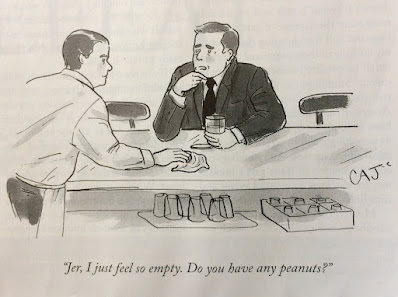Many of us remain stuck in one rut or another, for much of our adult lives. For a variety of reasons, we "keep doing the same thing over and over again, expecting different results." A surprisingly common motto in this "ordinary unhappiness" is: "if it ain't broke, don't fix it." Of course, we first have to finally realize that our life IS 'broke.' If we're lucky enough to experience a major shake-up, we might become motivated pursue a far deeper, more intimate engagement with life.
Jungian psychology can provide valuable insights into Mindfulness (MBSR). While Jungian psychology - like MBSR - is secular, it does use some Christian-sounding terminology. I've found that the more psycho-socially evolved people are, the less aversion they have towards various religions, even if they themselves are not affiliated with any specific religion. Much like hating oneself &/or others, rigidly holding animosity/anger/rage against one's own &/or others' religions absolutely freezes one's healing, growth & maturation. Such blocks often require professional help to resolve. The very basis of any form of healing & healthy maturation is gently releasing rigidly held, narrow, fear-based self-concepts & worldviews, and slowly, progressively opening up to psychologically more flexible, more spacious, inclusive, loving ways of being.
“… the Jungian perspective divides the development of the personality into two fundamental periods. The first is from birth to psychological midlife, commonly referred to as ‘the first half of life.’ The second is from psychological midlife to death, and is commonly referred to as ‘the second half of life.’
During the first half of life, our basic developmental task is to differentiate a personality as we grow out of childhood. That personality should be strong enough to find a place and to form relationships in the external world of societal life. It should be able to function effectively there, according to the common standards, aims, and goals of that world. In symbolic terms, this achievement is referred to in Jungian psychology as finding the common gold.
Generally, once this task is completed, we begin feeling lost – as though somehow, in achieving our place in life, we have lost ourselves. That is, we do so if we are alert enough to let that much self-awareness through our defenses. If we don’t or can’t, we will develop some other attention-getting type of symptom, usually expressed in the form of an emotional or physical dis-ease. In either case, our primary task in the second half of life is to come into relationship with our unconscious and the center of our being – our Self – by finding our soul and the meaning of our life. In this way, we discover the true gold, the symbol of the illuminated soul.
The Jungian analyst must take nature as his or her guide. What we do in analytic sessions is not so much therapy as it is furthering the development of the creative seed inherent in the analysand and nurturing that development. This process often includes going backward in a person’s life – especially family life – and helping the person create a friendly inner background in which his or her reconstruction can begin.
Once the corner is turned from the first half of life to the second, one discovers that a lifestyle that looks good and works (no matter how well) isn’t sufficient to provide the true gold of fulfillment. This realization alone is enough to give us an idea of how difficult the work of individuation can be.
During this turning point in personal growth, suffering evolves to a higher level. In this context, suffering comes to mean expending ‘blood, sweat, and tears’ with religious devotion in the effort to discover the true gold of our nature. It represents the courage to depart from conventional wisdom, ambition, pleasures, comforts, pride, and values in favor of following the creative voice within us. There are many possible wrong turns and no guarantees of success in this journey. But if we are successful, genuine self-realization rewards us by giving birth to a deeper experience of love, compassion, and joy in our lives.”
Bud Harris. “The Journey into Wholeness: A Jungian Guide to Discovering the Meaning of Your Life’s Path.” Daphne, 2020.
“While religion at its best calls us to a community of the curious and a unity beyond dogma and tribalism; religion at its worst calls us to worship the very things that divide us and to pit people against one another in the name of one fantasy or other.”
Rami Shapiro. “Holy Rascals. Advice for Spiritual Revolutionaries.” Sounds True, 2017.

